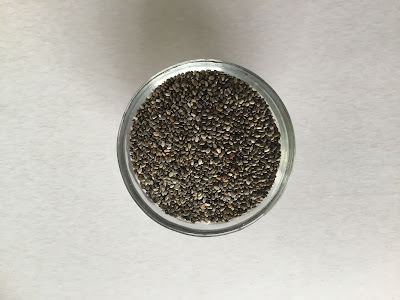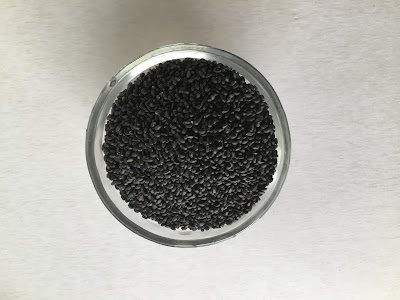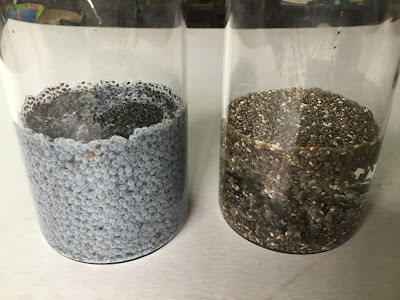Chia seeds v/s Basil seeds
You have probably heard the names of chia seeds and Basil seeds nowadays through the internet, health community and from the food industry. Since both seeds look alike, many of us think that chia seeds and basil seeds/Sabja seeds are the same. In actual fact, there is a lot of key differences between chia seeds and basil seeds. So here I tell you the differences between these wonder seeds.
 |
| Basil seeds v/s Chia seeds image ( ©Dr. Nehal's Ayurveda and Kitchen) |
What Chia seeds and Basil seeds are -
Chia seeds are tiny black/brown/grey seeds from the plant called Salvia Hispanica. It's related to what we know as mint family plants. Chia seeds were an important food for the Aztecs and Mayans ( people of an ancient civilization of Mexico, central and south America). In the ancient meaning of Chia is "Strength". Aztec warriors ate chia seeds to give them high energy and endurance.
 |
| Chia seeds image ( © Dr. Nehal's Ayurveda and kitchen) |
Basil seeds are the product of the Rudra Jada plant that comes under the Tulsi family but shouldn't be mistaken with holy basil or Tulsi. The scientific name of basil seed is ' Ocimum basilicum'. The common names of Basil seeds are; Sabja seeds, falooda seeds, Tukhmaria, sabja vethai, Hazbo, Tuk malanga, basil cultive,basiliien kruat, and sweet basil.
 |
| Basil seeds or Sabja seeds image ( © Dr. Nehal's Ayurveda and Kitchen ) |
What is the difference between Chia seeds and Basil seeds?
Origine:-
Chia seed's native is to central and southern Mexico, whereas basil seed's native to tropical regions from central Africa to Southeast Asia.
Color and appearance:-
 |
| Basil seeds v/s Chia seeds image ( ©Dr. Nehal's Ayurveda and Kitchen) |
Chia seeds can be black, white, brown or grey. They are small and oval. They look like sesame seeds but are not as flat as sesame seeds. They are mottled and have the design of random lines on the coat.
Basil seeds are fragrant when added to desserts or lemonade. They impact their own basil flavor touch.
Way of consumption:-
 |
| After soaking Basil seeds( Lt. side glass) v/s Chia seeds ( Rt. side glass) ( © Dr. Nehal's Ayurveda and Kitchen) |
Chia seeds can be consumed directly too, without any process. You may sprinkle them on yogurt, drinks, smoothies, puddings, oatmeal, etc. They expand and form a mucilaginous mass when soaked in water, but they require more time to absorb water than basil seeds. The flour obtained by grinding the seeds is also used to make bread and muffins. It is used as sprouts as snacks.
Basil seeds form a gelatinous thick mass after soaking in water. They mostly added to drinks, milkshakes, medicinal tea, dessert, and sherbets.
Oils:-
You can use oil of chia seeds for cooking but the benefits of the oil can be reaped by eating the seeds too, so there is no need to extract the oil. Chia seeds are packed with oil that rich in omega 3 fatty acids which are essential for metabolism.
Basil seeds are used in Ayurveda and Chinese medicines. It is used to treat nervous system disorder, relieve headache and lowers joint pain due to gout. It helps to relieve stress so it used for aromatherapy, massage, spa, etc.
Nutritional differences:-
It's generally thought that chia seeds are better for you, as they are rich in calcium, magnesium, phosphorus, potassium. They contain more protein and good fat than basil seeds. They are also loaded with antioxidants and fiber. They can strengthen your teeth and bones.
Basil seeds are rich in iron. They are highly nutritious and very low in calories. They are reported to have antioxidant, anticancer, antiviral, antibacterial, antispasmodic and antifungal properties.
Benefits to the body:-
Chia seeds help to maintain normal blood pressure and blood sugar levels. They help to lower elevated triglyceride levels and promote healthy cholesterol levels. Chia seeds are mainly used as an energy booster.
Basil seeds, on the other hand, function well as a diuretic and aid digestion. The richness of iron help to improve the quality of blood. They are one of the best body coolants, have a soothing effect on the stomach and hence useful to combat acidity.





No comments:
Post a Comment